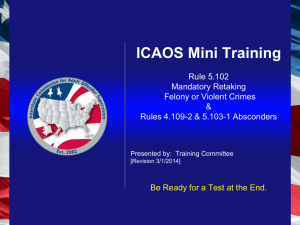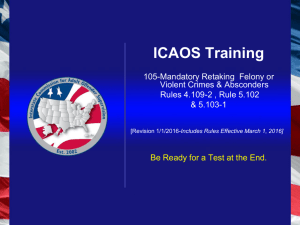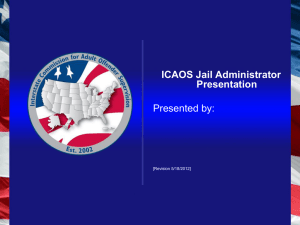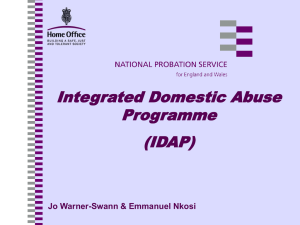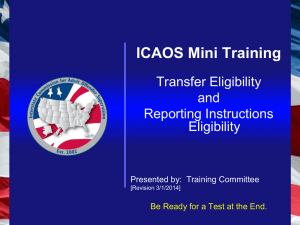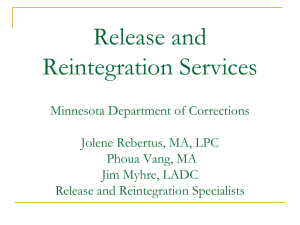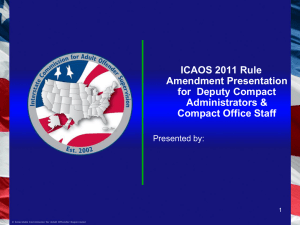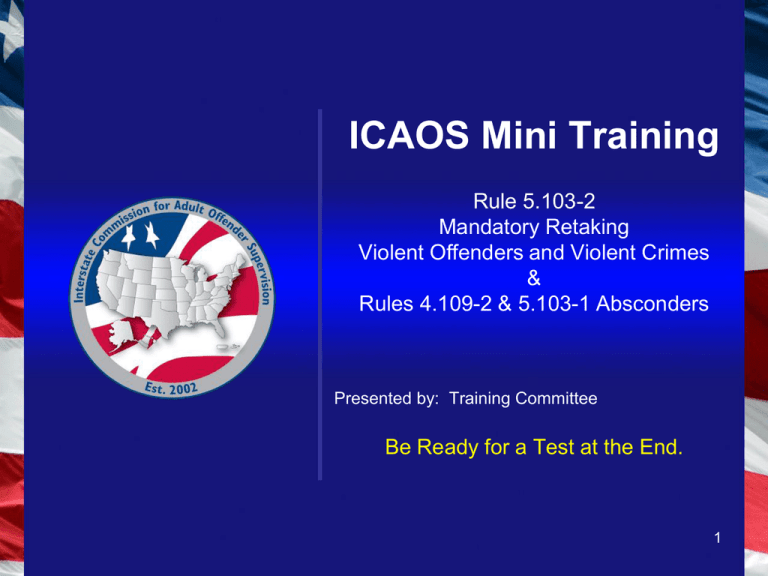
ICAOS Mini Training
Rule 5.103-2
Mandatory Retaking
Violent Offenders and Violent Crimes
&
Rules 4.109-2 & 5.103-1 Absconders
Presented by: Training Committee
Be Ready for a Test at the End.
1
Training Objectives
Key Definitions
• Define “Violent Offender”
• Define “Violent Crime”
• Define “Warrant”
• Define “Abscond”
• Define “Significant Violations”
What triggers Rule 5.103-2
• Commission of a significant violation
• Conviction for a new violent crime
What triggers Rule 4.109-2 & 5.103-1
• 3 Elements of “absconding”
2
“Violent Offender” and
“Violent Crime” Definitions
• “Violent Offender” means an offender under supervision
for a violent crime.
• “Violent Crime” means:
1. Unlawful exertion of physical force with the intent to cause
injury or physical harm to a person; OR
2. Offense in which a person incurred direct or threatened physical
or psychological harm as defined by the criminal code of the
state in which the crime occurred; OR
3. Use of a deadly weapon in the commission of a crime; OR
4. Sex offense requiring registration
• “Abscond” means to be absent from the offender’s
approved place of residence or employment with the
intent of avoiding supervision
“Warrant” Definition
• “Warrant” means a written order of the court or
authorities of a sending or receiving state or
other body of competent jurisdiction which is
made on behalf of the state, or United States,
issued pursuant to statute and/or rule and which
commands law enforcement to arrest an
offender. The warrant shall be entered in the
National Crime Information Center (NCIC)
Wanted Person File with a nationwide pick-up
radius.
Mandatory Retaking
Rules 5.103-1, 5.103-2
• Upon the request of the receiving state, the
sending state shall issue a warrant and retake:
– 5.103-2 (a) upon notice a “violent offender” has committed 1
significant violation
Significant Violation
An offender’s failure to comply with the terms or conditions of
supervision that, if occurring in the receiving state, would result
in a request for revocation of supervision.
– 5.103-2 (b) upon notice an “offender” has been convicted of a new
“violent crime”
– 5.103-1 upon receipt of an absconder violation report and case
closure
Rule 4.109-2
Absconding Violation
• (a) If there is reason to believe that an offender
has absconded, the receiving state shall attempt
to locate the offender. Such activities shall
include, but are not limited to:
– (1) Conducting a field contact at the last known place
of residence;
– (2) Contacting the last known place of employment; if
applicable;
– (3) Contacting known family members and collateral
contacts.
(b) If the offender is not located, the receiving
state shall submit a VR pursuant to Rule
4.109(b)(9)
Rule 5.103-1
Mandatory Retaking for Offenders Who
Abscond
• (a) Upon receipt of an absconder violation report and
case closure, the sending state shall issue a warrant
and, upon apprehension, file a detainer with the holding
facility where the offender is in custody
• (e) The sending state shall keep its warrant and detainer
in place until the offender is retaken
7
The Violation Report
In ICOTS
Violation Reports
• Submit within 30 days
of Discovery of
Significant Violation”
– An offender’s failure to
comply with the terms
or conditions of
supervision that, if
occurring in the
receiving state, would
result in a request for
revocation of
supervision.
How to Determine Significant
Violation
Committed
I Would
Request
Revocation
in my
State.
Significant
Violation
Violation
Committed
I Would
NOT
Request
Revocation
in my State.
NonSignificant
Violation
10
“Abscond” means to be absent from the offender’s approved place of
residence or employment with the intent of avoiding supervision
11
Recommendations
Recommendation must be:
Warrant should be issued.
DO NOT USE: “Remain Under Supervision”,
significant violations would initiate a revocation
in the receiving state and therefore would not
be considered for this option.
Refer to Training Bulletin: 3-2008
Response to Violation
Response to Violation
•
A sending state shall respond no later
than 10 business days
•
Response shall include:
1. action to be taken
2. date action will begin
3. estimated completion date
Rule 4.109
14
Response to Violation
When the RS Closes the Case
in ICOTS
• Under Rule 5.103-2, close the case once
the offender has been picked up by the
sending state
• Under Rule 4.109-2, close the case
immediately after submission of absconder
VR
Rule 4.112
16
Liability
• Liable is defined by Webster as “Legally
obligated; responsible…”
• All compact member states can be held
liable for circumventing or violating the
ICAOS rules.
• ICAOS rules are federal law and there is a
legal obligation to follow and enforce the
rules as written.
17
Scenario #1
In reference to the definition of “violent offender,” it
is the sending state which determines if an
offender is under supervision for a violent crime.
a) True
b) False
Scenario #2
I am supervising an interstate compact offender and he
has failed to report to his last 2 office visits. I can
submit a Violation Report and Case Closure for
absconding to the Sending State.
a) True
b) False
Scenario #3
I am an officer in the receiving state that is supervising
an offender who is currently on probation for Burglary
(F). The offender has priors for Robbery (F), Assault
with a Deadly Weapon (F), and Battery Domestic
Violence (M). Based on the “Violent Offender”
definition, this offender may be subject to mandatory
retaking requirements under ICAOS Rule 5.103-2.
a) True
b) False
20
Scenario #4
I am an officer in the receiving state that is
supervising an offender who is currently on
probation for Burglary (F). While under
supervision in my state, the offender receives
a new conviction for Battery Domestic
Violence (M). Based on the “Violent Crime”
definition, this offender may be subject to
mandatory retaking requirements under
ICAOS Rule 5.103-2.
a) True
b) False
21
Scenario #5
I am supervising a violent offender for another
state and have submitted a report of significant
violation to the sending state and asked the
sending state to retake the offender. The
sending state has responded that they are not
going to take any action on the offender and to
please continue to supervise. The next step is
to contact my compact office for assistance.
a) True
b) False
22
Questions
23

